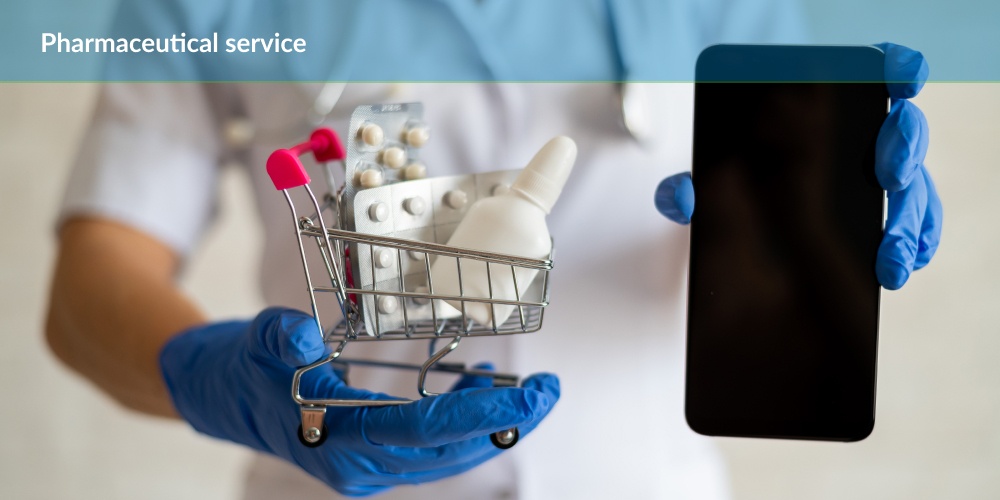Table of Contents
In a relentless pursuit of a healthier future, pharma services are revolutionizing treatment modalities and improving patient outcomes. With an unwavering commitment to innovation, the industry is witnessing a transformative era where advanced data analytics are becoming integral to driving informed decision-making processes. Moreover, the burgeoning field of biotechnology services plays a critical role in developing groundbreaking products that promise to redefine healthcare standards and carve the path for next-generation therapies.
Clinical Trials Management: Ensuring Success from Study to Submission
The success of the pharma services industry hinges significantly on the ability to execute efficient and compliant clinical trials. From meticulous study planning to the seamless submission of trial data, clinical trial management encompasses many critical steps. A robust management strategy ensures that every phase meets stringent regulatory standards and contributes to medical advancements safely and effectively.
Navigating Regulatory Compliance for Clinical Advancements
Regulatory compliance is one of the foremost considerations in clinical trials. It involves understanding and adhering to various national and international guidelines that govern how clinical trials should be conducted. The goal is to protect patient safety and ensure the integrity of the data collected. It necessitates a keen knowledge of the regulatory landscape and the ability to adapt trial protocols to meet these complex and constantly changing requirements.
Incorporating Real-world Evidence for More Robust Trials
Using real-world evidence (RWE) has become increasingly valuable in designing more effective and inclusive clinical trials. By leveraging data from actual patient experiences, pharma services companies can enhance the relevance of their clinical trial findings to broader patient populations. This approach improves the data quality and supports the development of treatments better tailored to patient needs in real-world settings.
Importance of Patient Support Programs During Trial Phases
Patient support programs, including Pharma Delivery, are pivotal in clinical trials as they bolster participant retention and engagement. These programs provide patients with the resources and support necessary to navigate the trial process comfortably and adhere to treatment protocols. They are essential for ensuring a positive patient experience, which can profoundly impact the quality and reliability of trial outcomes.
- Enhancing patient adherence to treatment regimens
- Providing education on trial procedures and expectations
- Offering emotional and psychological support
- Facilitating communication between patients and research teams
Effective clinical trial management is an integral part of the pharma service industry, ensuring that discoveries in the lab can successfully transition through the trial stages and reach the submission phase. Engaging patients, managing data, and ensuring compliance are all vital to the successful conclusion of clinical trials.
Pharmaceutical Supply Chain: The Backbone of Pharma Services
The pharma services chain is critical to the delivery of healthcare services globally. It forms the bridge between the production of pharmaceutical products and their delivery to healthcare providers and patients. With the ever-increasing complexity of medical treatments and global demand for pharmaceuticals, efficient supply chain management is more important than ever.
Managing logistics for uninterrupted delivery of products
Uninterrupted delivery of pharmaceutical products is essential for the health and well-being of patients worldwide. Effective logistics management ensures that medicines and healthcare products are transported safely, securely, and promptly from manufacturing facilities to the end users. The aim is to maintain product integrity and meet the demanding deadlines of the healthcare industry.
Specialty pharmacy services that cater to complex treatment needs
Specialty pharmacy services have become a key feature of the pharma service landscape, providing critical support for complex and chronic conditions that require special handling, administration, or monitoring. These services often include patient education, adherence support, and pharmacological advice alongside the distribution of specialty medications.
How digital health solutions are transforming supply chain efficiency
Digital health solutions are revolutionizing the pharmaceutical supply chain by improving data exchange, enhancing transparency, and optimizing operations. From blockchain technology ensuring secure product tracking to artificial intelligence forecasting demand and automating inventory management, digital tools streamline processes and mitigate the risk of drug shortages or delays.
- Real-time tracking: Advanced digital systems track shipments in real-time, ensuring all stakeholders are informed of a product’s journey.
- Predictive analytics: Analytical tools enable better demand forecasting, making supply chain operations proactive rather than reactive.
- Integrated platforms: Centralized digital platforms facilitate smoother collaboration between suppliers, manufacturers, and healthcare providers.
Market Access and Commercialization: From Lab to the Public
The journey of bringing a pharmaceutical product from the lab to the public encompasses a set of intricate steps geared toward market access and commercialization. During this phase, a drug’s true viability and potential impact are realized and brought to fruition with the support of the pharma services industry.
Strategies to Gain Market Access and Ensure Product Reach
Successfully navigating the complex landscape of healthcare regulations, payer systems, and competitive markets is essential for pharmaceutical companies. A strategic approach often involves:
- Targeted communication with regulatory bodies and insurers to showcase the drug’s benefits and cost-effectiveness.
- Establishing robust distribution networks to ensure the availability of pharmaceutical products to healthcare providers and patients.
- Developing pricing strategies that reflect the drug’s therapeutic value while being accessible to various market segments.
Health Economics and Outcomes Research in Product Lifecycle
Understanding and articulating the economic impact of new pharmaceutical products is critical:
- Health Economics and Outcomes Research (HEOR) plays a pivotal role in demonstrating the value proposition of a new drug.
- HEOR data supports reimbursement discussions and market positioning by highlighting efficacy, safety, and cost benefits relative to existing treatments.
Utilizing Digital Platforms for Market Education and Product Promotion
The digital age has provided an unprecedented avenue for educating the market and promoting pharmaceutical products:
Health Economics and Outcomes Research (HEOR) plays a pivotal role in demonstrating the value proposition of a new drug. HEOR data supports reimbursement discussions and market positioning by highlighting efficacy, safety, and cost benefits relative to existing treatments. This field employs a multidisciplinary approach, drawing on economics, epidemiology, and statistics principles to evaluate the real-world impact of healthcare interventions. HEOR provides crucial insights into adopting new therapies’ economic and clinical implications by analyzing patient outcomes, healthcare utilization, and costs.
Additionally, HEOR studies often incorporate patient-reported outcomes and quality-of-life measures, offering a comprehensive understanding of the broader impact of healthcare interventions on individuals and society. Pharma services, including data analysis, market research, and strategic consulting, support HEOR initiatives, providing the expertise and resources necessary to conduct rigorous evaluations and communicate findings effectively to stakeholders. In collaboration with pharma services, HEOR serves as a vital tool for decision-makers in healthcare policy, payer organizations, and pharmaceutical companies, helping inform resource allocation, treatment guidelines, and investment strategies.
Pharmacovigilance and Drug Safety: A Patient-Centric Approach
As the pharmaceutical services industry progresses, ensuring patient safety remains paramount, making pharmacovigilance services a cornerstone of the industry. Emphasizing a patient-centric approach upholds safety and forges the path toward more efficacious treatments.
Ensuring Patient Safety Through Dedicated Pharmacovigilance Services
The core of pharmacovigilance is monitoring and evaluating the effects of medicines, with the ultimate goal of detecting, assessing, and preventing adverse events. A robust pharmacovigilance system is integral to maintaining trust and safety in pharmaceutical products, as it protects patients by ensuring that potential risks are managed and mitigated efficiently.
Engaging with Patients to Monitor Treatment Outcomes
Active engagement with patients is crucial for effective pharmacovigilance. By understanding the patient experience, pharmaceutical companies can capture real-world data on drug efficacy and safety. This direct feedback mechanism enables a more dynamic response to treatment concerns, enhancing the overall standard of care.
Leveraging Patient Feedback for Service and Product Improvements
Integrating patient feedback into pharmaceutical R&D can significantly improve the quality of pharma services and products. Patient feedback provides valuable insights that can lead to drug formulations, administration methods, and service delivery innovations, ensuring that patients’ evolving needs and safety are met.
Role of Pharmacovigilance
- Continuous monitoring of drug performance and patient health outcomes
- Adaptation of services based on direct patient-report data
- Incorporation of safety signals into product lifecycle management
The pharma services industry can better align with patient needs while upholding the highest safety standards by placing the patient at the center of pharmacovigilance and drug safety strategies.
Specialty Pharmacy Services: Personalized Care for Complex Needs
Understanding the critical importance of managing complex medical conditions, specialty pharma services emerge as a beacon of hope for patients requiring targeted and intensive pharmaceutical care. The unique challenges presented by specialty pharmaceuticals call for a highly personalized approach, ensuring that every patient’s needs are met with precision and empathy.
Addressing the Unique Challenges of Specialty Pharmaceuticals
Specialty pharmaceuticals often involve complex treatment regimens for severe or chronic conditions. These medications can be biologics, require special handling, or have restricted distribution. Emphasizing patient safety and optimal therapeutic outcomes, specialty pharmacies provide tailored services to navigate these intricacies effectively.
Offering Patient-Centric Services for Improved Health Outcomes
The core of specialty pharmacy services lies in the personalized care extended to individuals. By crafting customized treatment plans and providing comprehensive support, these services prioritize patient engagement and adherence, leading to significantly improved health outcomes.
Integrating with Digital Health Platforms for Better Service Delivery
Integrating specialty pharmacy services with advanced digital health platforms is paramount in this digital transformation era. This fusion enhances service delivery, streamlines communication, and facilitates better management of complex treatment protocols by the pharma services group. Empowering patients through technology ensures that top-notch care is always within reach.
- Specialized counseling and education programs that strengthen understanding of complex treatment plans
- Assistance with insurance navigation and reimbursement coordination to reduce financial burden
- Collaboration with healthcare providers to monitor patient progress and adjust treatments as necessary
- Use of precision medicine to tailor treatments based on individual patient genetics and disease state
Specialty pharmacy services are more than just a means to dispense medication; they are a pledge to deliver personalized care for those facing the most challenging health conditions, promoting a path to wellness as unique as the patients they serve.
Pro Tip:
In specialty pharmacy, prioritize personalized care by leveraging digital health platforms for streamlined communication and integrating precision medicine for tailored treatment plans, ensuring optimal outcomes for patients with complex medical needs.
Data Analytics and Real-World Evidence: Powering Information-Driven Decisions
The ever-growing field of pharmaceutical services now pivots around the pivotal role of data analytics and real-world evidence. These cutting-edge tools are not just supplementary but foundational in making strategic, information-driven decisions that benefit the entire pharmaceutical value chain. By harnessing the power of big data, pharmaceutical services groups can enhance efficiency and innovation at every phase of drug development and beyond.
Utilizing Big Data for Enhancing Every Phase of the Pharmaceutical Value Chain
Big data analytics provides a comprehensive overview of the pharmaceutical lifecycle, from drug discovery to post-market surveillance. By analyzing vast datasets, companies can uncover patterns and insights that lead to more efficient processes, cost reductions, and, ultimately, higher-quality patient products.
Information as a Key Driver for Treatment Innovation and Service Improvement
The integration of extensive databases has become a cornerstone for treatment innovation. As information stands as a key driver, the marriage between extensive patient data and analytical algorithms now guides the development of new services and improvements in treatment protocols, ensuring that patients receive the most effective care possible.
Adopting a Data-Driven Approach for Quality Assurance and Control
Quality assurance and control are critically enhanced through a data-driven approach. By meticulously monitoring and analyzing production processes, patient outcomes, and market trends, pharma services can foresee and mitigate risks, validate the efficacy of products, and ensure compliance with rigorous regulatory standards.
- Big data is revolutionizing predictive analytics, enabling early identification of potential market trends and patient needs.
- Real-world evidence provides a practical perspective on how drugs perform outside clinical trials, leading to improved patient-centered care.
- Data-driven decisions foster an environment where continuous improvement is not just a goal but a measurable reality.
Embracing data analytics and real-world evidence is no longer optional for pharma services seeking to remain competitive and deliver optimal health outcomes. The future of pharma resides in the ability to effectively gather, analyze, and employ data to make more informed decisions that will shape the health landscape for years.
Manufacturing and Scale-up Solutions: Meeting Global Demand
As the pharmaceutical industry strives to cater to the ever-increasing global demand for medication, manufacturing, and scale-up solutions play a pivotal role in ensuring that drugs are produced efficiently and in the necessary quantities. The challenge lies in expanding production capacity without compromising the quality of pharmaceutical products.
Challenges and Solutions in Scaling Up Drug Manufacturing
The process of scaling up drug manufacturing is fraught with challenges, including regulatory hurdles, supply chain complexities, and the need for significant capital investment. To address these issues, pharma services emphasize innovation in process development, adopting modular facilities, and integrating continuous manufacturing techniques that allow for greater flexibility and faster turnaround times.
Ensuring Consistent Quality with Robust Quality Assurance Practices
Maintaining a high level of product quality during the scale-up phase is a non-negotiable aspect of pharmaceutical production. It demands a robust quality assurance framework that extends throughout the manufacturing process. By implementing strict quality protocols and continuous monitoring, pharma services can ensure that each batch of drugs meets the industry’s stringent standards, regardless of the production scale.
Leveraging Technology for Efficient Manufacturing Processes
In the era of technological advancements, leveraging cutting-edge technologies is paramount to enhancing efficiency and capacity in drug manufacturing. Automation, artificial intelligence, and machine learning are revolutionizing pharma services, enabling quicker decision-making, predictive maintenance, and optimized production processes, all of which contribute to the seamless scale-up of pharmaceutical manufacturing to meet the pressing demands of a growing global population.
Quality Assurance and Control: Upholding the Highest Standards
An unyielding commitment to quality assurance (QA) and quality control (QC) is at the core of any reputable pharma service. These critical functions ensure that every product meets the stringent standards of the pharmaceutical industry, from initial development to post-market surveillance.
The Critical Role of Quality Control Throughout the Pharmaceutical Lifecycle
Quality control is not an end-stage process but an integral part of the entire pharmaceutical lifecycle. From sourcing raw materials to manufacturing the final product, QC measures are in place to guarantee that all aspects of drug production are within specification and safe for patient use. Continuous monitoring and testing provide the necessary checks and balances that underscore pharmaceutical products’ safety, efficacy, and integrity.
Implementing Best Practices for Regulatory Compliance and Patient Safety
Pharma services thrive on compliance with regulatory standards, which evolve with scientific advancements and societal needs. Implementing best practices for regulatory compliance is not just about adhering to guidelines; it is a dedication to patient safety and delivering high-quality healthcare. Our robust regulatory strategies and quality management systems are designed to exceed expectations and ensure patients receive safe, effective, and reliable pharmaceutical products.
Investing in Quality to Maintain a Reputation as a Leading Pharma Service Provider
Investing in quality is investing in the company’s future and reputation. Maintaining rigorous QA and QC standards reinforces its leading pharma service provider position. Quality is recognized as an invaluable asset that fosters trust, builds lasting relationships with healthcare providers, and guarantees patient satisfaction and well-being. The dedication to excellence is a promise made to every stakeholder in the healthcare value chain.
- Ensuring products are manufactured under the highest quality standards
- Maintaining rigorous testing protocols to guarantee product consistency
- Conducting thorough audits and reviews to improve processes continuously
- Engaging in proactive risk management to address potential quality issues
By integrating state-of-the-art quality measures and fostering a culture of continuous improvement, pharma service remains at the forefront of delivering top-tier healthcare solutions.
Biotechnology Services: Unlocking New Treatment Potentials
The convergence of biotechnology and pharmaceutical services heralds a new era of medical innovation, where complex challenges meet cutting-edge solutions. Biotechnology services play a pivotal role in propelling the pharmaceutical industry forward by leveraging advancements in biological processes. This division is fundamental to developing groundbreaking treatments and improving patient health outcomes.
Exploring the Intersection Between Biotech and Pharma for Innovative Solutions
The amalgamation of biotechnology and pharmaceutical services has given rise to various innovative therapeutic options. Biotech’s focus on cellular and biomolecular processes enhances the drug development lifecycle, from discovery to delivery. These advancements are expanding the range of possible treatments and streamlining the path to market for new drugs.
Collaboration Between Biotech and Pharma for Improved Patient Health
Strong collaboration between biotech companies and pharma service providers is critical in bringing advanced treatments to patients faster. This synergy leverages the strengths of both sectors to meet the demanding and dynamic needs of patient health care. It fosters a climate of innovation where collective expertise can flourish, creating new opportunities for therapeutic intervention where previously there were none.
- Genetic engineering: This technique has led to the development of personalized medicines that are more effective and have fewer side effects.
- Enzyme replacement therapies: A significant stride within biotech, providing vital solutions for patients with rare genetic disorders.
- Cell therapies and regenerative medicine: These emerging fields within biotech offer the potential for treatments that can repair, replace, regenerate, and rejuvenate cells and tissues.
Pro Tip: Foster strong collaboration between biotech and pharma services to maximize innovation and accelerate therapeutic advancements, leveraging the strengths of each sector to meet evolving patient needs.
Health Economics and Outcomes Research: Demonstrating Value
The landscape of the pharma services industry is ever-evolving, and within it, the role of Health Economics and Outcomes Research (HEOR) has grown substantially. HEOR offers a systematic approach to quantifying healthcare interventions’ value, guiding providers and payers in their decision-making processes. This critical discipline converges on the nexus where economics, healthcare, and patient outcomes intersect, providing tangible data to support the value proposition of new and existing treatments.
Quantifying the Economic Impact of Pharma Services on Healthcare
The economic burden of disease is a pressing concern for healthcare systems globally. By assessing the direct and indirect costs associated with medical treatments, HEOR is indispensable in revealing the economic impact of pharma services. These evaluations help stakeholders understand the financial benefits of investing in effective and efficient healthcare interventions, leading to more sustainable healthcare models.
Using Outcomes Research to Prove the Value of New Treatments
Emerging treatments must demonstrate clinical efficacy and economic justifications to gain a foothold in the marketplace. Outcomes research is pivotal in this context, as it measures the real-world effectiveness and impact of new treatments. This research substantiates the value of pharmaceutical innovations by linking their costs to tangible health outcomes, influencing their uptake and integration into clinical practice.
Informing Payer Decisions through Comprehensive Health Economics Studies
Healthcare payers are tasked with making informed decisions that balance cost with patient benefit. Comprehensive health economics studies provide these stakeholders with the evidence necessary to make choices that ensure both the effectiveness of treatments and the sustainability of healthcare systems. By leveraging data on treatment outcomes, comparative analyses, and cost-effective assessments, HEOR helps payers navigate the intricacies of reimbursement models and formulary placements.
- Evaluation of direct cost savings from advanced treatments
- Measuring the decrease in hospitalization rates due to effective pharma services
- Assessing improved patient quality of life and its long-term economic benefits
- Analyzing cost-offsets resulting from precision medicine and personalized care
Integrating Health Economics and Outcomes Research into the broader pharma service landscape is critical for demonstrating the overarching value of healthcare interventions. By focusing on economic and outcome-based evidence, HEOR enriches the dialogue around healthcare innovation, ensuring that patient care advances are clinically sound and economically viable.
Digital Health Solutions: The Future of Pharma Services
The landscape of pharma services is undergoing a seismic shift as digital health solutions become increasingly integral to delivering high-quality, effective healthcare. These innovative technologies are not just complementing traditional services; they are shaping a new future for the industry and revolutionizing patient care.
Embracing Digital Transformation for More Effective Healthcare Delivery
The advent of digital transformation within the pharma service sector is not just a trend; it is a necessary evolution to meet the complex demands of modern healthcare. Digital platforms enable pharma companies to streamline processes, enhance communication, and deploy resources more efficiently, all while keeping patient outcomes at the forefront of their mission.
Key Takeaways
Pharma services increasingly rely on data analytics and real-world evidence to drive informed decisions across the pharmaceutical value chain, from drug development to market access. Harnessing big data allows for more efficient processes, cost reductions, and higher-quality products, ultimately benefiting patients.
Patient engagement is central to various aspects of pharma services, including clinical trials, pharmacovigilance, and specialty pharmacy services. By prioritizing patient needs, offering personalized care, and integrating patient feedback into service improvements, the industry aims to enhance health outcomes and ensure patient safety.
Integrating digital health solutions transforms the pharmaceutical landscape, enhancing supply chain efficiency, communication, and service delivery. From real-time tracking and predictive analytics to integrated platforms, digital technologies drive operational excellence and improve patient care.
Compliance with regulatory standards and maintaining high-quality standards are non-negotiable aspects of pharma services. Robust regulatory strategies, quality management systems, and continuous improvement efforts are essential for ensuring patient safety, building trust, and sustaining the industry’s reputation.
Collaboration between biotech companies and pharma service providers drives innovation and accelerates the development of advanced treatments. By leveraging each other’s strengths, the industry is expanding treatment options, addressing unmet medical needs, and improving patient health outcomes.
Conclusion
The journey through the pharmaceutical landscape, from inception in drug development to the hands of patients, is intricate and demands a robust ecosystem of services. We have explored the pivotal touchpoints, including clinical trial management, supply chain logistics, commercialization strategies, and the critical role of digital health solutions, illustrating the immense value they add to patient care and treatment effectiveness. Comprehensive pharma services are not just accessory aspects but the bedrock upon which successful patient outcomes are built.
To pharmaceutical companies aiming to excel in a competitive market, incorporating and investing in these services could mean the difference between leading the market or lagging. By prioritizing pharmaceutical excellence and aligning with dedicated pharma service providers, you position your business at the forefront of innovation and quality in patient care.
Revolutionize patient care and enhance treatment efficacy through NetworkON, a comprehensive pharma service.
CTA- NetworkON encourages industry professionals to delve deeper into the pharma services we offer. To do so, visit our website and discover a trove of expertise that awaits your engagement at your fingertips. Our pharma delivery service is meticulously crafted to enhance your understanding and application of indispensable pharma services.
Frequently Asked Questions
What are pharma services?
Pharma services encompass a range of support functions within the pharmaceutical industry, including clinical trial management, supply chain logistics, market access strategies, pharmacovigilance, and more. These services are essential for ensuring the safety, efficacy, and accessibility of pharmaceutical products.
Why is patient engagement important in pharma services?
Patient engagement is crucial in pharma services because it ensures that treatments are tailored to meet individual patient needs, improves adherence to treatment regimens, enhances the quality of clinical trial data, and fosters trust between patients and healthcare providers.
How do digital health solutions benefit pharma services?
Digital health solutions streamline processes, enhance communication, and optimize resource allocation within pharma services. They enable real-time tracking of pharmaceutical products, predictive analytics for demand forecasting, and integrated platforms for collaboration between stakeholders, ultimately improving efficiency and patient care.
What role does Health Economics and Outcomes Research (HEOR) play in pharma services?
HEOR quantifies the value of healthcare interventions by assessing their economic impact and real-world effectiveness. It provides crucial data to support market access strategies, reimbursement decisions, and treatment innovation, helping stakeholders make informed choices that benefit patients and healthcare systems.





0 Conversations